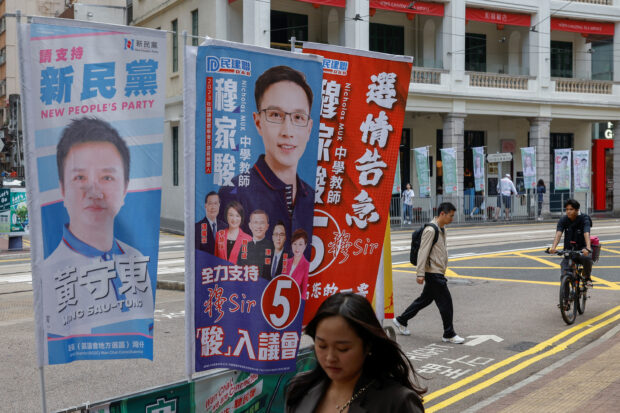Hong Kong seeks to boost turnout in ‘patriots only’ election

A woman walks past campaign banners of district council election candidates displayed on a street in Hong Kong, China December 9, 2023. REUTERS
HONG KONG — Hong Kong holds its first “patriots only” district elections on Sunday as a national security crackdown imposed by Beijing further marginalizes formerly popular opposition figures in the China-ruled city.
The pro-China government has been seeking to boost turnout, as some observers see large numbers spurning the polls, in contrast to the last council elections in 2019, during Hong Kong’s mass pro-democracy protests, which drew a record 71% turnout and a landslide victory for the democratic camp.
Amendments introduced in July slashed the directly elected district council seats by nearly 80% from four years ago.
All candidates must now undergo national security background checks and secure nominations from pro-government committees, effectively barring democrats, including moderates and even some pro-Beijing figures.
The changes further narrow electoral freedoms in the former colony that Britain returned to Chinese rule in 1997. The crackdown under a 2020 China-imposed national security law has led to the arrests of former district councillors and the disbandment of major opposition parties.
Article continues after this advertisementWhile some western governments say the national security law has been used to crack down on dissent, China says it has brought stability to the financial hub after the protracted pro-democracy protests of 2019.
Article continues after this advertisementHong Kong’s constitutional affairs secretary Eric Tsang warned of the risks of “anti-China” disrupters seeking to undermine voting. Local media said over 10,000 police would be deployed to ensure order on Sunday.
‘Hard to talk about democracy’
Critics call the elections, in which only 88 of the 470 seats are directly elected, undemocratic.
“I would rather choose to be myself and stick with my original values and beliefs,” said Johnny Chung, a pro-democracy district councillor who decided to quit running for public office.
For weeks the major pro-Beijing and pro-government parties have been out in force, campaigning and festooning streets with posters and flyers in a bid to bolster turnout.
“It’s very hard to talk about democracy or democratization anymore in today’s Hong Kong,” said Kenneth Chan, a political scientist at Hong Kong’s Baptist University and a former pro-democracy lawmaker, who described the polls as “backtracking” on democracy.
“What they’re doing now is the installation of the so-called patriots-only governance structure.”
Senior officials including city leader John Lee, who previously said turnout was not important, have since gone on a blitz to promote the elections, which they say are broadly representative.
“You can see that we are campaigning every day and we are trying our best to get every vote,” said Peggy Lee, a candidate running in Wanchai district on Hong Kong island.
“So it’s a real election.”